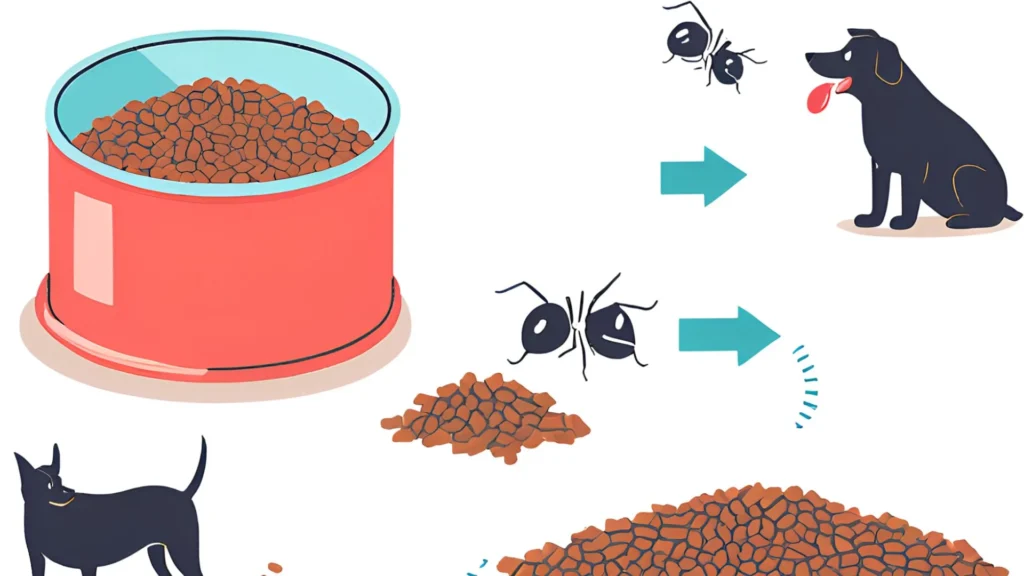Dealing with ants in dog food can be incredibly frustrating for any pet owner. Over the years, I’ve learned the hard way how important it is to know how to get ants out of dog food.
Ants are naturally attracted to the high-protein and fatty content in dog food, and once they find it, they can quickly take over.
As a dog owner, I’ve had my fair share of struggles with ants infiltrating my pet’s food storage, especially during warmer months.
Through trial and error, I’ve found several effective methods to eliminate ants, from better storage practices to using natural repellents.
In this guide, I’ll share my tips for managing the problem and keeping your pet’s food safe and ant-free.
Why Are Ants Attracted to Dog Food?
Ants are always on the lookout for food sources, especially those rich in carbohydrates, fats, and proteins exactly what many dog foods contain.
Whether it’s dry kibble or wet food, the ingredients can be a buffet for foraging ants. Here’s why ants find your dog’s food irresistible:
✔ High Nutritional Value: Dog food, particularly kibble, is full of protein, fat, and sugars that ants crave.
✔ Easy Access: Dog bowls are often placed on the floor or outdoors, making them accessible to ants.
✔ Residue and Crumbs: Even if the food bowl is empty, leftover crumbs or oily residue can attract ants.
✔ Poor Storage: An improperly sealed dog food bag or container can invite ants into your pantry or garage.
How To Get Ants Out Of Dog Food?
To eliminate ants from your dog’s food, lightly dust the food with cornstarch to encourage the ants to release their grip, then sift the food to remove them.
Another method involves freezing the affected food, which kills the ants, followed by straining. To avoid future infestations, store the food in sealed, airtight containers and maintain a clean feeding environment.

Will Ants In Dog Food Hurt My Dog?
Ants in dog food are not usually dangerous, but they can still cause problems. Some dogs may refuse to eat the food because of the taste or texture.
In rare cases, ants can bite the inside of a dog’s mouth, causing pain or swelling. Eating large amounts of ants could also upset your dog’s stomach. It’s a good idea to remove the ants and keep the food area clean.
Tips Preventing Future Ant Infestations
➢ Ants are attracted to crumbs, grease, and food residues. Wipe down surfaces regularly and sweep floors to remove any food scraps.
➢ Keep dog food, pet treats, and other food items in airtight containers to prevent ants from getting to them.
➢ Check for cracks or gaps in windows, doors, and walls. Seal any openings to block ants from entering your home.
➢ Ants dislike strong scents like cinnamon, vinegar, or lemon. Sprinkle these around entry points or use essential oils to repel them.
➢ Keep trash cans tightly sealed and dispose of waste often to avoid attracting ants.
➢ If ants have already invaded, strategically place ant bait to lure them away from food sources and kill the colony.
How Ants Get Into Dog Food?
Ants typically get into dog food by following scent trails left by scout ants that have discovered the food. Once an ant finds an accessible food source, it releases a pheromone trail leading other ants to the same spot.
If dog food is left out in an open container or exposed, ants can easily find their way in, especially if the food contains attractive nutrients like protein, fats, or sugar. Cracks in doors, windows, or walls also provide easy entry points for ants to reach the food.
What Should I Do If My Dog Ate Ants?
If your dog ate ants, there’s usually no cause for concern, especially if they were harmless ants. However, monitor your dog for signs of discomfort, like drooling, vomiting, or swelling, particularly if they ate fire ants, which can sting.
Make sure your dog stays hydrated, and if you notice any unusual symptoms or if they consumed a large number of ants, contact your vet for advice.
What Smell Does Ants Hate?
Ants are deterred by powerful, pungent odors. Natural repellents like peppermint oil, tea tree oil, cinnamon, vinegar, and garlic work effectively to keep ants at bay.
They also avoid the scent of citrus fruits such as lemons and oranges, along with spicy substances like cayenne pepper and even coffee grounds. These smells disrupt ants’ sensory pathways, making the area less attractive to them.
Conclusion
To effectively get ants out of dog food, it’s crucial to maintain cleanliness and take preventive steps. Store the food in a sealed container, regularly clean the feeding area, and consider using natural repellents.
If ants have already invaded, removing the contaminated food and cleaning the area thoroughly will help. A combination of these strategies can ensure that your dog’s food remains free from ants and safe to consume.
Taking action quickly and consistently will help you keep both your pet’s food and home ant-free.

Hello dog lovers, I am John. Welcome to my website healthydogfoods.com. I am happy to gain experience from my love for my dog and my pet dog. Through my experience and acquaintance with dog veterinarians, I have made myself a proper guide for dogs. I will tell you about dog care, their nutritious food, their proper safety and dog upbringing for a better life. Even though dogs cannot talk like humans, I will solve all the problems by observing their behavior. I will discuss the proper care and related issues of your dog. Which will give you the right answer to all the problems of your beloved dog.